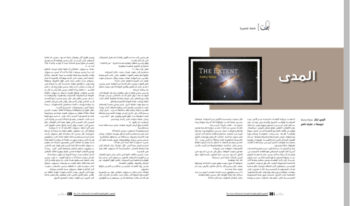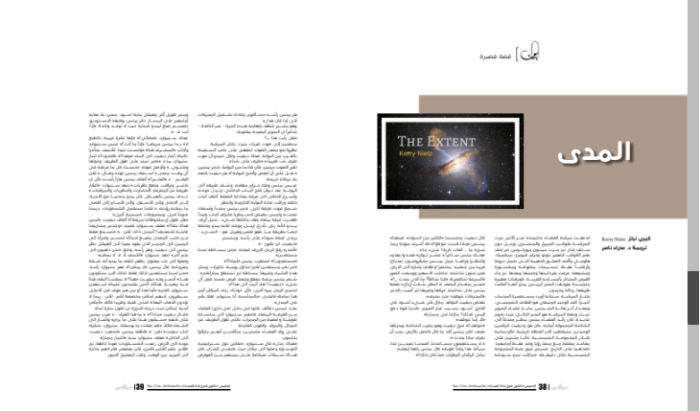Celebrating a Story Published in Iraq
This post will take a moment to celebrate what is in fact a minor matter: the publication of a single flash fiction story (“The Extent”) by only one author (“Kerry Nietz”) in a single Iraqi literary magazine (“Bien Nahreen” i.e. “Between the Rivers”). Of course only God knows if this single story will bear any greater fruit in the future of even more stories being published in Iraq and elsewhere. But I hope it does–and I’ll explain why.
Let me start by talking about some of my personal history: I spent January through October of 2008 mostly in the so-called “Green Zone” located in Baghdad, Iraq. Post the US invasion of Iraq in 2003, a section of the capital city was reserved for the use of the United States and other international partners who formed what we all called the “Coalition,” who were in charge of Iraq at that time. This international group gave the area its correct name, the “International Zone,” a place that was “green” as in permissive (to travel through), but only in terms relative to the rest of Iraq.
The IZ, pronounced as separate letters (as those of us who were there often called the “Green Zone”), was at its greatest length around seven kilometers long and about two wide at the narrowest, an irregularly shaped strip of land along a bend of the west bank of the Tigris River. The zone was walled off from the rest of Baghdad, except for controlled security checkpoints, but it was not cut off from Iraqis. Some 2,000 Iraqis who lived in the IZ before it was separated from the rest of Iraq continued to live there. So individual camps with walls and security checkpoints existed within the IZ for foreigners, places that Shia militias and others subjected to rocket and mortar attacks.

Myself and officers I worked with posing outside the entrance to Phoenix Base, in the IZ.
So, on a typical day, as I’d walk back from work at Phoenix Base in the IZ (which bordered an Iraqi headquarters camp also in the zone) to the separate camp where I lived, Blackhawk, it would not be unusual for an Iraqi teenage boy to ride up on a bicycle and call out to me, “LT, LT, you wanna buy Saddam money?” (I was a First Lieutenant at the time and the Iraqi kids all seemed to know how to read our ranks.) “You wanna buy movies?”

Sweating in the IZ–me at the Iraqi Tomb of the Unknown Soldier in 2008
I wore my helmet (or carried it with me at times) and body armor and a pistol as a side arm while in between IZ camps, required to dress like that by a policy mainly inspired by rocket and mortar attacks. Very uncomfortable when it got up over 120 degrees, which was a common temperature for an Iraqi afternoon. So on most days I wasn’t too interested in buying anything. Though on a few occasions I “window shopped” while trying to practice speaking what little Arabic I knew, letting a grinning Iraqi teenager show me old-style Iraqi money with Saddam Hussein on the bills, something Americans and Brits and our other allies in the IZ must have bought in large amounts, because that was usually the first thing they offered to sell us. But the second thing was usually pirated DVDs.
I never bought any of the cash decorated with Saddam’s mustachioed face, but I actually did buy a few DVDs. Some of them had horrible quality, some weren’t bad, but all of them were copies of almost exclusively American movies pirated and made into DVDs in China, then sold back into Iraq (and other countries), where a tiny fraction of them were offered to an American soldier by Iraqi teenage boys.

An Iraqi teen talking to a US Marine. Photo credit: www.marines.mil.
If you’re an American who hasn’t traveled overseas much, you might presume that Iraqis would mostly watch movies made in their own country, just as we watch movies produced in our own nation. But that’s mostly not the case. American movies are a massive international export, seen all over the world–even in countries where people can’t afford to see them in theaters or pay for regular DVDs, via pirated copies.
In fact, even countries with a strong tradition of making their own movies, like France, are awash with made-in-USA culture. And this is also true to a somewhat lesser degree for books and music made in the USA.
But note this is mostly true for the mainstream popular culture. Authors like George R. R. Martin and Anne Rice are translated far more than authors writing with Christian themes (though of course some Christian authors get translated and sell overseas).
I think this creates an opportunity for Christians who write speculative fiction–because at least some foreigners are used to receiving fiction made in the USA, are used to accepting and having interest in fiction our nation generates. Especially our speculative fiction. That implies in my mind a great opportunity exists to sell stories in other countries and to perhaps even find credibility as Christian authors we may not enjoy in our own nation.
Though my interest in overseas publication isn’t primarily about sales or credibility. It happens to be the case that some of the most popular products of our culture overseas are morally very grim, devoid of godliness. Wouldn’t it be great to reach the world with stories that instead subtly or overtly find a place for Christianity? Expressing something that points to a better and higher calling? Making use of an already-established international interest in speculative fiction generated in the USA, metaphorically hacking the system of entertainment that already exists of American culture flowing overseas–inserting into the system our own program?
This is a notion I’ve been talking about for several years now. In that time I’ve had two books translated into Spanish, but neither released yet due to issues with revision of the stories. Likewise, friends have translated a short story anthology into Portuguese, but editing issues remain. And several projects in French are ongoing, likewise facing issues of editing and polishing. I’ve had to accept things haven’t happened as fast as I want–I’ve had to accept that God tells Christians to say, “God willing” concerning the future for a very good reason. We never know for certain what tomorrow will bring, which is something it’s only wise to humbly acknowledge (even as we continue to work and pray).
But in the midst of me learning and growing in understanding, God showed his ability to work the unexpected. Through an online writer friend (Sarah Witenhafer) who knew an Iraqi translator (Ahdraa Naser) looking for help editing a book of Iraqi poetry translated into English (which I helped with), I made a connection that allowed for a particular Kerry Nietz flash fiction story to be translated into Arabic and published in an Iraqi Literary magazine. I was not some sort of mastermind astutely manipulating these events–the events just took place, via what would seem to be a set of accidents…but which I trust to be the providence of God.

Screenshot of “The Extent” translated into Arabic.
This is like a single seed dropped accidentally on unknown soil and sprouted up unexpectedly. It’s not a crop able to feed a multitude and in and of itself, it’s not hugely significant. But it shows it’s at least possible for the good seed to grow in the soil that had been unknown. Which inspires a little celebration: yes, this is possible! At least to a small degree, yes!
God willing, someday soon many more opportunities to plant many more stories written by Christian authors (both from the USA and elsewhere) into foreign soil will present themselves. I’m looking forward to that day. But in the meantime, please understand while I’m celebrating what’s already happened. Thank you Sarah, thank you Ahdraa, thank you Kerry, but most to the point, thank you, thank you, God!










































Very cool. Congrats, Kerry!
That sounds awesome! Congrats to Kerry and everyone else involved in the publication 🙂
Kind of has me generally curious about how our stories’ themes, etc. might be interpreted in other cultures. If a fantasy book talks about a creator, would someone from a more Islamic background imagine Allah? I know that stuff depends on a lot of factors, but I suppose it’s important to keep that stuff in mind when an author intents to publish in multiple countries.
Sure, Autumn, I imagine someone with an Islamic background will think of Allah. But you know, I would say that in certain ways, the Islamic concept of God is very similar to the Christian idea of God. Using what we have in common as a basis to open the door to distinctly Christian ideas isn’t a bad thing.
And yes, in general, it’s important to understand target cultures in a variety of ways. But the advantage we have in the United States, without even realizing it, is that most foreigners are at least a little familiar with American culture. Which means we can talk to them from our cultural references to a degree and still be understood. (Which has positive and negative aspects, but when it comes to selling stories overseas, is pretty cool.)
Yeah, I agree that it can be helpful in that sense, and I generally don’t have an issue with Christian authors trying to sell their work overseas even if there are some risks. I do try to think ahead to all the potential outcomes of things, though, so misinterpretation is something that came to mind when considering possibilities.
Of course, that’s partly because in a lot of my stories it would be kind of easy to misinterpret. In my current WIP, for instance, there isn’t a Jesus like figure mentioned (for worldbuilding reasons), but God still exists in that world even if he’s called something else. If I handed that book to someone of a vastly different culture without any explanation of the content, it’d be pretty understandable if that person misinterpreted it.
And I suppose either way that working with someone from the cultures we publish in, or at least someone pretty in tune with those cultures, helps a lot in terms of understanding how something will be received/understanding what hurtles may be present, even outside of issues like misinterpretation.